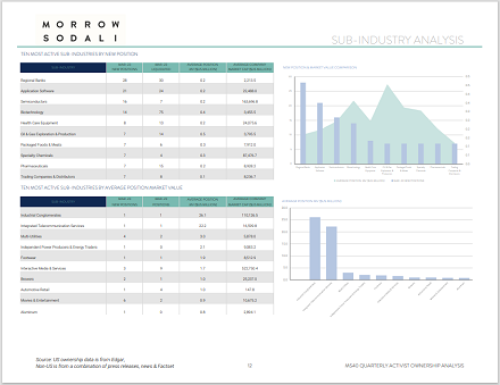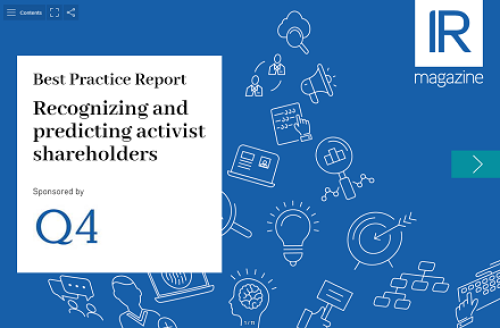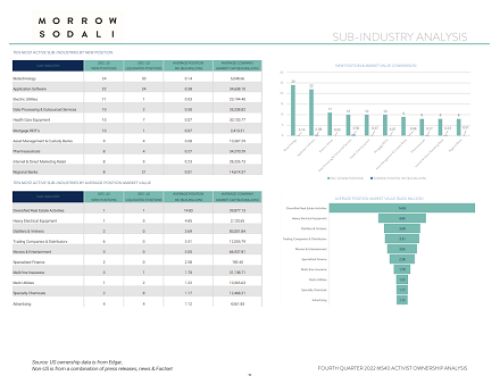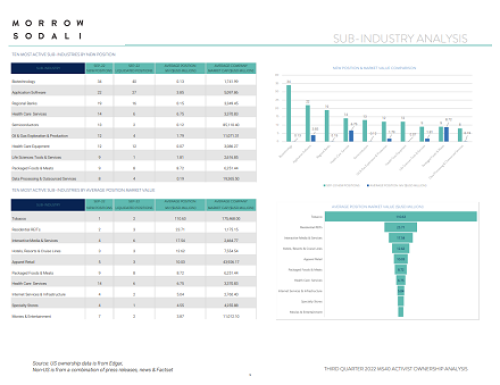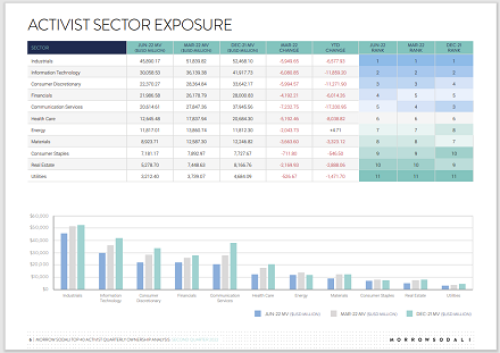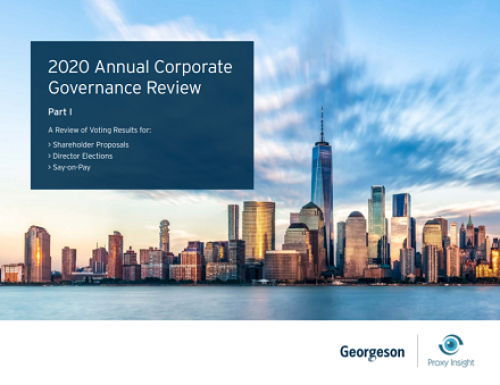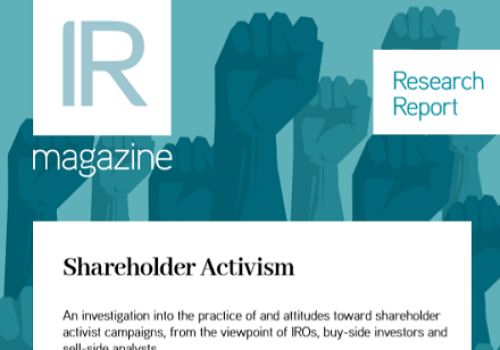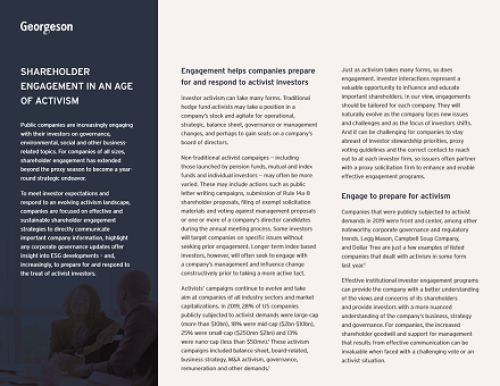A leading New York policy wonk has criticized the shareholding and activist process in the US, with a particular condemnation of ESG issues and the influence of special interest groups, in testimony given to a Senate committee hearing this week.
James Copland, director of legal policy at the New York-based conservative think tank the Manhattan Institute for Policy Research, listed a number of issues to the Senate Committee on Banking, Housing and Urban Affairs that are having a negative impact on shareholder value.
First, he questioned the focus on ESG factors that has emerged in the investor arena, thanks in part to BlackRock CEO Larry Fink’s infamous letter. ‘His letter nevertheless provoked controversy because it weighed in on one side of a debate that has raged on for a century – and, in one reading, embraced what has generally been the minority view, at least in terms of legal responsibilities,’ said Copland.
Social investing
On the issue of investor-related ESG, Copland suggested it could be being forced on the investment world. ‘Recognizing that an institutional fund manager’s social-investing goal may be appropriate for the informed investor who embraces that goal does not imply that such a social-investing goal is appropriate for institutional asset managers that do not clearly announce to investors their social purpose.
‘And it does not imply that such a social investing goal should be imported more generally into our investment, securities and corporate laws, nor that such laws should enable actors pursuing such goals to impose them on corporate managers.’
Given State Street Global Advisers’ Fearless Girl campaign and BlackRock’s commitment to prioritizing talking with companies about gender balance on boards, as well as climate risk, Copland asked: ‘Had institutional investors suddenly decided their previous reluctance to embrace social and environmental causes had been misguided – and that these issues were now key factors in maximizing share return? The answer is almost surely no, however fund families spin their efforts through public relations releases.’
Copland says there is now, however, a bias toward ESG among asset managers. ‘Large institutional investors tend to have in-house corporate governance teams to handle proxy voting matters,’ he observed. ‘These in-house positions are often staffed by former employees of proxy advisers – thus sharing those proxy advisers’ biases – or are otherwise at least somewhat committed to environmental or social-investing causes.’
Assessing this view, Marc Hodak, a partner at corporate governance consultancy Farient Advisors, tells IR Magazine: ‘There is no question that public company corporate governance is becoming increasingly politicized. Executives and boards are very aware of the ESG concerns not just of their investors, but also of their customers, employees and other stakeholders.
‘How this plays out for shareholders is an open question. Right now, nearly every investor expressing interest in ESG initiatives is making the case that greater sensitivity to stakeholder concerns will ultimately help shareholders, so this broader focus is not intended to be at odds with their fiduciary duties. But many of the specific ESG initiatives being proposed don’t have much empirical support showing their impact on shareholder value.’
Shareholder voting rights
Copland then turned to American corporate law and the central question involving the intersection of institutional investing and shareholder voting rights.
He said: ‘In general, shareholder voting rights have been thought of as a tool – complementary to legal fiduciary duties and market exit rights – to mitigate agency costs between corporate managers and equity owners. But such voting rights today are dominated by institutional investors. And most of these institutional investors themselves have substantial agency costs, between fund managers and individual investors.
‘Institutional investors – either directly or through other intermediaries, such as proxy advisory funds – are monitoring corporate boards and managers. But who’s monitoring the monitors? The answer is decidedly not the ordinary, average investor.
‘Individual investors delegate their investment decisions to intermediaries precisely to avoid complexities like the minutiae of proxy voting. Individuals may shift their assets from one fund manager to another, but such moves will be prompted by relative portfolio performance or fee structure or public controversy – not by shareholder voting.’
Copland tied shareholder voting to so-called special interests, an approach usually used in the political arena from a conservative perspective to critique pressure groups, usually of a left-wing persuasion, that influence democratic institutions and processes that are arguably beyond that of their actual support base.
‘Our current body of federal securities laws, as interpreted and enforced by the SEC, has very much been enabling special interests,’ he said. ‘Under current SEC rules, any shareholder in a publicly traded corporation that has held at least $2,000 in stock for at least a year may place a proposal on the company’s proxy ballot. A shareholder can introduce the same proposal year after year, even when 90 percent of all voting shareholders consistently oppose it.’
These rules have enabled special-interest shareholders to capture the attention of corporate boards and managers, at all other shareholders’ expense, added Copland: ‘In 2016 and 2017, a majority of shareholder proposals sponsored at Fortune 250 companies involved social or policy issues largely unrelated to share value, executive compensation or traditional board-governance concerns.’
Corporate gadflies
Here, again, Copland laid some of the blame at the SEC’s door. ‘The SEC’s lenient shareholder-proposal rules have also empowered a very small number of investors with limited investment stakes to assume an outsized role in corporate-boardroom debates,’ he said. ‘Three individuals and their family members – commonly called ‘corporate gadflies’ – have sponsored between 25 percent and 45 percent of all shareholder proposals in recent years.
‘Today, navigating the special-interest investor is simply an expected cost of being a publicly traded corporation. In February jeans-maker Levi Strauss filed the paperwork to become a publicly traded corporation. In March the People for the Ethical Treatment of Animals (Peta) announced it was acquiring shares in Levi’s in order to propose shareholder resolutions involving the manufacturer’s use of leather patches. Peta’s decision was not related to investment concerns; it announced it was acquiring the minimum number of shares required to reach the SEC’s $2,000 threshold.
‘Historically, groups like Peta have been able to garner significant attention through introducing proxy ballot items but have been unable to win the support of a majority of shareholders for their precatory ballot items. But some caution is in order. Beyond institutional investors with an express social-investing purpose, many investment vehicles with large holdings are affiliated with organized labor.’
In reply, Peta’s director, Elisa Allen, tells IR Magazine: ‘Peta US holds stock in a number of food, pharmaceutical, biotechnology and other companies – including Canada Goose, Levi’s, SeaWorld and Prada – that support animal abuse so that the group can have a presence at annual meetings.
‘Shareholders in a publicly traded company are entitled to bring resolutions, or proposals, to a vote as part of the annual meeting process. And presenting a resolution on an animal-welfare issue when a company is dragging its feet pays off.
‘Peta US has withdrawn resolutions from the annual meetings of Denny’s, Safeway, McDonald’s, 3M, DowDuPont and GE following productive discussions and successful negotiations that stemmed from filing resolutions with these companies – and it will continue taking an active role as a shareholder until targeted companies make the kind and business-savvy decision to stop using animals.’
Proxy firms and special interest
Copland’s criticism then turned to proxy advisory firms, which, he said, can serve to amplify such special-interest advocacy. ‘To manage their proxy voting, institutional investors rely heavily on a pair of proxy advisory firms: ISS, which is today owned by private equity firm Genstar Capital, and Glass Lewis, a subsidiary of the Ontario Teachers’ Pension Plan Board.
‘Together, these two proxy advisers control approximately 97 percent of the market for proxy advisory services, with ISS alone having about a 61 percent share. By its own estimation, ISS annually helps approximately 2,000 clients execute nearly 10.2 mn ballots representing more than 4.2 tn shares.
‘As summarized in a 2018 report I co-authored with Stanford’s David Larcker and Brian Tayan, a substantial body of empirical evidence shows that proxy advisory firms’ recommendations influence institutional investor voting and that publicly traded companies are influenced by proxy adviser guidelines. A 2012 analysis I co-authored shows that an ISS recommendation for a given shareholder proposal, controlling for other factors, was associated with a 15 percentage-point increase in the shareholder vote for any given proposal.
‘My report with Larcker and Tayan also cites a substantial body of empirical evidence demonstrating that at least some proxy-adviser advice may not be in the average shareholder’s interest. Notwithstanding its substantial influence over shareholder voting, ISS is a relatively small operation. Prior to its 2014 private acquisition, it had just over $15 mn in profits on $122 mn in revenues. Its small size makes ISS particularly vulnerable to capture, if it is being managed to maximize its profits.
‘And ISS’ voting guidelines have generally shown a propensity to support various social and environmental proposals, much more so than the median shareholder. Historically, ISS has backed around 70 percent of shareholder proposals related to political spending, 45 percent of those related to employment rights and 35 percent of those related to human rights or the environment – a sharp contrast to the dearth of average shareholder support for these proposal classes.’
In reply, an ISS spokesperson tells IR Magazine: ‘ISS is not an activist organization. Rather, we are a policy-based research firm that is fully transparent with regard to how we analyze matters on proxy ballots. Firms such as ISS neither propose shareholder initiatives nor decide what is on the proxy ballot. That’s a decision for company management and, in some limited cases, the company’s shareholders.’
On influence, the spokesperson says: ‘While ISS recommended against roughly 14 percent of say-on-pay resolutions for the top 3,000 US companies in 2018, just 2 percent failed to pass. These numbers underscore that investors make up their own minds.’
And on market concentration, the spokesperson says: ‘We’ve earned our market share by virtue of leadership in the industry for more than three decades. Our 95 percent proxy voting and research client retention rate in 2018 attests to this. Clients value what we do and how we do it.
‘Barriers to entry for prospective proxy advisers is low, as evidenced by the many that have come on line in regions and markets ranging from Europe to India and Australia. We are one of many in a number of major markets globally.’
Adding another perspective, Hodak says: ‘A lot of the perceived problems with the influence of special interests and proxy advisers on institutional investors are the result of past regulations. In compensation, we continually see the unintended consequences of well-intentioned reforms. So we have to be very skeptical of how new regulations, including those on proxy plumbing, are likely to impact the markets.’
A sweeping policy oversight by institutional investors is, however, further afield than the agency costs shareholder-voting rights are intended to mitigate, argued Copland. ‘It is particularly strange when employed by index funds,’ he noted. ‘The premise of such funds is to leverage capital-market efficiency and minimize active management costs – in essence, to follow the stock market. Yet in shareholder-voting decisions, such fund families are actively supporting efforts to modify corporate behavior. There is no clear investment-based rationale for this obvious tension in strategy.’
Hurting shareholder value
Copland therefore argued: ‘The aggressive sweep of shareholder influence over corporate handling of far-flung social and environmental causes can hurt shareholder value. Entrepreneurs and investors tend to opt for equity ownership notwithstanding high agency costs.
‘Aside from the risk-bearing advantages of equity, there is good reason to believe one reason why we tend to see shareholder ownership as the dominant form of complex business organization is that it minimizes collective decision-making costs.
‘Other forms of ownership – employee ownership, customer ownership and supplier ownership – can handle risk-bearing to some significant extent but tend only to exist in limited circumstances. And in such cases, rules tend to exist to limit the costs of disparate interests in decision-making – like law firms’ strong bias toward screening partners for a preference for very high work hours.
‘Understanding that disparate voting interests along multiple factors can make collective action difficult requires no specialized understanding of public-choice theory – and should be quite evident to members of the US Senate.’
Copland cited a 2015 Manhattan Institute-commissioned econometric study of shareholder activism and firm value. Tracie Woidtke, a professor at the Haslam College of Business at the University of Tennessee, examined the valuation effects associated with public pension fund influence, measured through ownership, on Fortune 250 companies. She finds that ‘public pension funds’ ownership is associated with lower firm value’ and, more particularly, that ‘social-issue shareholder-proposal activism appears to be negatively related to firm value.’
As such, on this reading, public employee pension funds’ use of the shareholder-proposal process in an effort to affect corporate behavior in pursuit of social or policy goals may be harming the financial interests of plan beneficiaries – and ultimately state and local taxpayers – as well as, by inference, the average diversified investor.
Concluding, Copland said: ‘Abetted by SEC rules and procedures, idiosyncratic corporate gadflies and institutional investors with labor affiliations and social-investing orientations have gained power in the boardroom. By co-opting proxy advisory firms – and, to some degree, institutional investors facing their own significant agency costs – these activists have pursued their agendas at other shareholders’ expense. At least some of this social activism appears to be depressing share value.’


